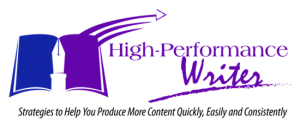 Many people think the term “high performance” applies only to machines, like cars. However, high performance applies to people like you—writers—as well. The most successful people in any industry are high performers. Writers, also, need to become a high-performers if they want to succeed.
Many people think the term “high performance” applies only to machines, like cars. However, high performance applies to people like you—writers—as well. The most successful people in any industry are high performers. Writers, also, need to become a high-performers if they want to succeed.
You may not have been born with high performance characteristics. However, you can learn to increase your performance so you have heightened and sustained levels of clarity, energy, courage, productivity, and influence—qualities writers and authors need.
I got interested in high performance after attending Brendon Burchard’s High Performance Academy. Of course, I’ve always been interested in personal development and psychology. At the event, I realized quickly that, although many people saw me as clear-minded, energetic, productive, courageous, and influential, I could level up in almost every area of my life—personally and professionally. After completing a round of Certified High Performance Coaching, I knew I wanted to become a coach myself. I wanted to live the principles, and I wanted to offer Certified High Performance Coaching to writers and authors, many of whom need to become more productive, courageous, and influential.
Let me explain what high performance is and why nonfiction writers need to develop this character trait.
What Does High Performance Mean?
High performance means excelling beyond standard norms consistently and long term—not occasionally. These norms are not other people’s standard norms; they are your own standard norms. Thus, you make no comparison between yourself and others. Instead, you continually work to increase your own level of performance, and then you sustain that level until you are ready to level up again.
You can demonstrate high performance personally and professionally. That’s why high performance impacts every aspect of your life. In fact, it affects your physiology, psychology, productivity, as well as your persuasive skill. It also affects your ability to be present in every moment and to fulfill your potential and purpose.
Why Do Nonfiction Writers Need High Performance?
The majority of aspiring and published nonfiction writers I know don’t write as much as they’d like. They don’t produce and ship work regularly. They talk about writing, but they don’t make the time. They complain that life gets in the way of their art. They aren’t productive.
 Nor are they influential. They don’t have platforms, and they don’t inspire or motivate readers. They don’t make a positive and meaningful impact in the world with their words because the either don’t write or have no one with whom to share that writing.
Nor are they influential. They don’t have platforms, and they don’t inspire or motivate readers. They don’t make a positive and meaningful impact in the world with their words because the either don’t write or have no one with whom to share that writing.
These writers may also lack focus and vision about their work or feel too tired or burned out to pursue their projects. Also, they may feel stuck in stress, worry, overwhelm, and fear.
The reason why is simple: They don’t possess high-performance traits, such as clarity, energy, courage, productivity, and influence. They don’t have the skill or strategies used by high performers in every industry, ones that help them buckle down and do the work. They don’t stay focused, present, on purpose, and intentional.
However, you can become a high-performance writer, and begin churning out manuscripts, blog posts, marketing materials, and more. Intentionally approach your writing (and your life) as a high performer by bringing engagement, joy, and confidence, as well as presence and purpose, to every aspect of your work (and life). When you do, you will find yourself performing like a race car. You’ll consistently keep your mental and physical engine generating positive states of being that help you get to your destination. All your systems will run smoothly, helping you “race” toward your goals and dreams.
High-performance tools help you focus and intentionally approach your work despite the distractions and demands you encounter daily. And today, nonfiction writers encounter a ton of distractions, like email and social media. As a high-performance writer, however, you possess the ability and the tools to manage the chaos in your life. You take on the varying tasks, such as promotion, writing, and business, with ease, because you have the tools and strategies that help you focus your attention, block out distractions, and energetically approach your work.
Race to Your Best Writing Self
There’s a difference between a race car and a high performer. Despite an experienced driver, a race car sometimes spins out of control. The car’s high performance can prove unreliable—the car can run out of gas, experience an engine problem, or, if it gets sideswiped or rear-ended, can lose its ability to be navigated to safety.
High performance writers know how to avoid crashes and keep their “engines” running smoothly in all situations. They know how to steer their vehicles in a deliberate and consistent manner toward the finish line. That means they are more likely to finish the race.
How do they do that? They manage their psychology, physiology, productivity, and persuasive ability. They learn how to manage (and change) their limiting beliefs, fears, and negative thoughts. They push themselves to eat a healthy diet, strengthen their bodies regularly, and get enough sleep, and they are present and focused so they accomplish more in less time. They become good role models, inspiring and motivating those they encounter.
High performance helps you generate the intentionality necessary to “race” forward toward your writing goals and dreams. As a high performer, you know how to maneuver smoothly around every corner, past every obstacle, and through traffic jams. You maintain (or regain) equilibrium when you get “bumped,” encounter a flat tire, or get squeezed out of your spot on the track.
Isn’t it time you got into the driver’s seat of your writing life and took control of the wheel? Isn’t it time you took your foot off the brake and hit the gas? Isn’t it time you gave your writing life (and your whole life) a tune up? Of course, it is.
Don’t wait! It’s your time…now…to level up so you can achieve your potential, fulfill your purpose and live your life fully.
Photo copyright: Franck Boston|Shutterstock.com